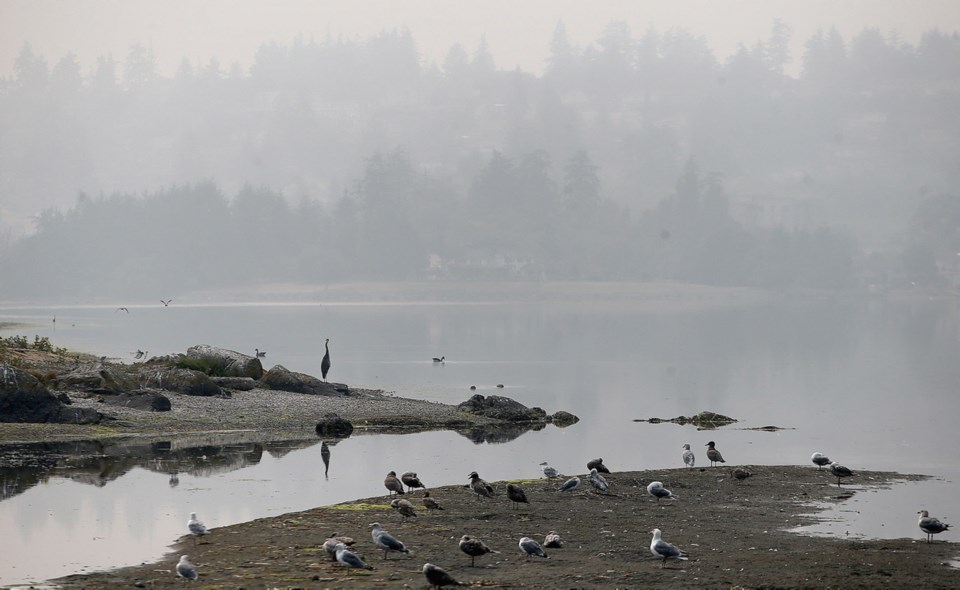Greater Victoria residents were treated to clearer skies and cleaner air Thursday morning, as wind blew the heavy smoke east on Wednesday night and early Thursday.
Many noticed that the smoke was especially thick and acrid Wednesday night, but that was due to strong winds that pushed it from west to east across the Juan de Fuca Strait, said Environment Canada meteorologist Ross MacDonald Thursday morning.
“With that fresher, cooler marine air we started to see that smoke get flushed out,” MacDonald said. “The change happened fairly dramatically.”
Langford and Saanich fire departments received a flurry of calls overnight from residents who were convinced a new fire was causing the blanket of thick smoke. Langford fire tweeted that the heavy smoke was due to shifting winds and asked people to call 911 only if they see a distinct column of smoke or flames.
#yyj @saanich @SaanichEP Saanich Fire Is receiving numerous calls regarding heavy smoke in the area. There are currently no active fires in Saanich and increasing winds are disturbing the smoke from the northern forest fires.
— Saanich Fire (@SaanichFire) August 23, 2018
The intense smoke in the area is from the fires throughout the Province - this is due to shifting winds and temperature change. There are no local fires at this time. #csaan #BCWildfires #smogust
— Central Saanich Fire (@CSaanichFire) August 23, 2018
The heavy smoke is due to the wind shifting and there are no fires in the Westshore. Please only call 911 if you see a distinct column of smoke or see flames. pic.twitter.com/UREPud0T8h
— Langford Fire Rescue (@LangfordFire) August 23, 2018
The visibility had already improved Thursday morning, MacDonald said. Visibility readings in Victoria were 13 kilometres compared to between two and four kilometres the day before.
“It is a welcome change to clear the smoke out,” he said.
The air quality health index, which ranks the health risk associated with air pollution, now rates the air across Vancouver Island as a low to moderate risk, a marked improvement from Wednesday, when the air posed a very high health risk.
Conditions across Metro Vancouver should clear up by the end of the day, MacDonald said, but the Interior will have to endure smoky skies for a few more days.
> More information on B.C.'s wildfires at timescolonist.com/more
Greater Victoria will start to see cooler temperatures hovering around 19 or 20 C, MacDonald said.
The Victoria area has no rain in the immediate forecast, but there could be rain on the north Island, where most of the Island’s wildfires are.
In Zeballos, the Sikorsky S-64 Skycrane heavy-lift helicopter dumped water on a 95-hectare wildfire that continues to burn on a steep slope. The helicopter was grounded due to smoke on Monday, but resumed operations Tuesday and Wednesday, when it dumped more than 900,000 litres of water, said Lynne Wheeler, public information officer for the Coastal Fire Service.
Six homes on the east side of the village have been evacuated and other homes remain under evacuation alert, which means residents should be ready to leave if the fire moves closer.
The Coastal Fire Service has received calls from worried residents who have heard the crackling of flames and debris tumbling down the mountain.
“They were saying how nervous it’s making them,” Wheeler said. “It’s pretty dramatic for them.”
While wind in the forecast could help clear the smoke, it could also cause fires to spread, said Ryan Turcotte, a spokesman for the B.C. Wildfire Service.
“It will take a long period of rain to bring any reprieve to the wildfire situation,” he said Wednesday during a conference call.
There are 563 active wildfires in B.C., 16 of which started Tuesday. Fires are being fought by 3,738 personnel and 239 aircraft.
Because so many fires are burning simultaneously, it has been difficult to get enough resources to respond to all of them, Turcotte said.
“Certainly, we are prioritizing and making sure we’re responding to areas that pose the most direct threat to people and property,” he said. “Given the amount of fire on the landscape, responding to all of them can be a challenge at times.”
Premier John Horgan said during a trip to Prince George on Tuesday that successive B.C. governments budgeted a “laughable” amount of money to fight wildfires and that the provincial and federal governments must dedicate adequate resources to keep communities safe.
B.C. budgeted $63 million for wildfire suppression in the 2018-19 season but has already spent $274 million, according to the Ministry of Forests.
The hazy conditions have not been serious or prolonged enough to drive tourists away from Greater Victoria or Vancouver Island, said tourism consultant Frank Bourree.
A record number of travellers are expected to come to Greater Victoria this month via B.C. Ferries and the Victoria International Airport, said Bourree, who runs Chemistry Consulting Group.
“We’re going to see record numbers in August despite [the wildfires],” he said. “A lot of people who were considering the Okanagan or the Kootenays are choosing to come to the Island.”
- with files from the Canadian Press



